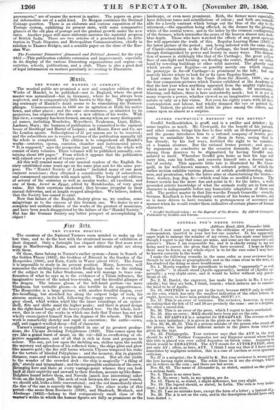Muir.
THE WORKS OF HANDEL IN GERMANY.
The musical public are promised a new and complete edition of the Works of Handel, to be published—not in England, where the great master was naturalized—but in Germany, where he has always been neglected, and is comparatively little known to this day. The approach- ing centenary of Handers death seems to be stimulating the Teutonic phlegm. Commemorations in 1859 are in agitation at Halle his native -town, and other places ; and the same circumstance, as admitted by its projectors, has originated the idea of a new edition of his works. With this view, a company has been formed, among whom are many distinguish- ed names, including Moscheles, Meyerbeer, Neukomm, Liszt, Hiller, Lochner, Marx; the business of publication is committed to the eminent house of Breitkopf and Haste' of Leipzic ; and Messrs. Ewer and Co. are the London agents. Subscriptions of 2/. per annum are to be received ; and the subscribers are to receive portions of the publication annually till the whole is completed. The edition is to comprehend all Handers works—oratorios, operas, cantatas, chamber and instrumental pieces. -" It is supposed," says the prospectus just issued, "that the whole will -consist of sixty volumes. Three volumes will be published annually, con- -taining about 480 pages." From which it appears that the publication -will extend over a period of twenty years !
All this will remind many of our musical readers of the English So- ciety established some years ago on the same plan and for the same pur- pose. The "Handel Society of London" included many of our most eminent musicians ; they obtained a considerable body of subscribers,. and commenced operations with much spirit. They brought out editions of several of the oratorios as well as secular works ; all excellent, and one of them, Israel in Egypt, edited by Mendelssohn, of very great value. But their exertions slackened ; they became irregular in their :annual deliveriea, and at length stopped altogether. We believe, indeed, that the Society has ceased to exist.
Now that failure of the English Society gives us, we confess, some 'misgivings as to the success of this German one. We desire to see a oomplete and uniform edition of the works of the greatest of musicians, and have been much disappointed by the failure of the "Handel Society." ;But has the German Society any better prospect of accomplishing its Called ?


























 Previous page
Previous page